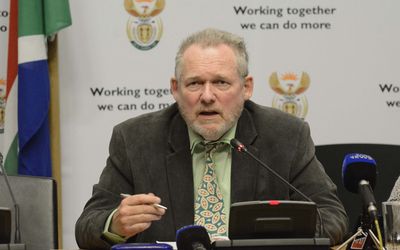THE Democratic Alliance (DA) says Trade and Industry Minister Rob Davies showed a lack of leadership in failing to drive the negotiating process to meet the December 31 2015 deadline set by US President Barack Obama for the opening up of the South African market for US meat exports.
However, industry experts argue that the government was correct in not backing down on the sanitary and phytosanitary standards that apply to meat imports. The failure to reach an agreement on standards means SA’s agricultural exports to the US stand to lose the tariff-free benefits they enjoyed under the African Growth and Opportunity Act (Agoa).
A compromise was on the table until the 11th hour, but, according to domestic meat industry sources, no agreement could be reached on food safety and animal health issues related to US chicken, pork and beef imports.
The stark choice for the government, they point out, was either to raise the health risks for South Africans and the country’s animal population, or have agricultural exports to the US lose their tariff-free benefits under Agoa.
Agreement was reached on the issue of avian flu, but not on acceptable salmonella levels in chicken and the treatment of porcine reproductive and respiratory syndrome in pork cuts.
However, a protocol on avian flu was agreed by US and South African veterinarians. A regional approach that will not affect the export of bone-in chicken portions from the US not affected by the disease will be adopted. In terms of an agreement between the chicken industries of the countries, 65,000 tonnes of US bone-in chicken portions will be allowed into SA each year, free of antidumping duties.
South African Poultry Association CEO Kevin Lovell said the salmonella standard adopted by SA was a combination of the international standard developed by the World Organisation for Animal Health and the European Union. He rejected the view of DA trade and industry spokesman Geordin Hill-Lewis that SA was imposing sanitary and phytosanitary standards that no other country applied, saying SA’s standards were internationally acceptable.
Mr Lovell stressed the importance of improving standards. Lowering the existing acceptable level of salmonella for imported chicken would inevitably mean lowering the standard for the domestic product as well.
"We had good reason not to agree to that," he said, adding that SA has less salmonella than the US. "Our position is based on scientific facts. The local industry would be very, very unhappy if SA backed down to the US and lowered its salmonella standards."
Mr Lovell said US exporters would be able to export chicken portions to SA under the quota, but faced the risk of the meat being rejected after testing at South African ports of entry because of an unacceptable level of salmonella.
With regard to pork, the US refused to accede to SA’s demand that pork cuts be treated for porcine reproductive and respiratory syndrome in the same way that Canadian and German pork exporters to SA were required to. Mr Lovell said that the domestic pork industry had spent hundreds of millions of rand eliminating porcine reproductive and respiratory syndrome from the domestic pig population.
There were also issues of disagreement over beef imports. Association of Meat Importers and Exporters CEO David Wolpert appealed to the US to grant a grace period to allow for the resolution of the outstanding issues.
Mr Hill-Lewis was strong in his condemnation of the government’s handling of the negotiations.
He warned that other products could be removed progressively from the Agoa benefits. Failure to meet agreed deadlines had caused "irreparable damage" to SA’s reputation as a trading partner.

Trade and Industry Minister Rob Davies. Picture: TREVOR SAMSON
THE Democratic Alliance (DA) says Trade and Industry Minister Rob Davies showed a lack of leadership in failing to drive the negotiating process to meet the December 31 2015 deadline set by US President Barack Obama for the opening up of the South African market for US meat exports.
However, industry experts argue that the government was correct in not backing down on the sanitary and phytosanitary standards that apply to meat imports. The failure to reach an agreement on standards means SA’s agricultural exports to the US stand to lose the tariff-free benefits they enjoyed under the African Growth and Opportunity Act (Agoa).
A compromise was on the table until the 11th hour, but, according to domestic meat industry sources, no agreement could be reached on food safety and animal health issues related to US chicken, pork and beef imports.
The stark choice for the government, they point out, was either to raise the health risks for South Africans and the country’s animal population, or have agricultural exports to the US lose their tariff-free benefits under Agoa.
Agreement was reached on the issue of avian flu, but not on acceptable salmonella levels in chicken and the treatment of porcine reproductive and respiratory syndrome in pork cuts.
However, a protocol on avian flu was agreed by US and South African veterinarians. A regional approach that will not affect the export of bone-in chicken portions from the US not affected by the disease will be adopted. In terms of an agreement between the chicken industries of the countries, 65,000 tonnes of US bone-in chicken portions will be allowed into SA each year, free of antidumping duties.
South African Poultry Association CEO Kevin Lovell said the salmonella standard adopted by SA was a combination of the international standard developed by the World Organisation for Animal Health and the European Union. He rejected the view of DA trade and industry spokesman Geordin Hill-Lewis that SA was imposing sanitary and phytosanitary standards that no other country applied, saying SA’s standards were internationally acceptable.
Mr Lovell stressed the importance of improving standards. Lowering the existing acceptable level of salmonella for imported chicken would inevitably mean lowering the standard for the domestic product as well.
"We had good reason not to agree to that," he said, adding that SA has less salmonella than the US. "Our position is based on scientific facts. The local industry would be very, very unhappy if SA backed down to the US and lowered its salmonella standards."
Mr Lovell said US exporters would be able to export chicken portions to SA under the quota, but faced the risk of the meat being rejected after testing at South African ports of entry because of an unacceptable level of salmonella.
With regard to pork, the US refused to accede to SA’s demand that pork cuts be treated for porcine reproductive and respiratory syndrome in the same way that Canadian and German pork exporters to SA were required to. Mr Lovell said that the domestic pork industry had spent hundreds of millions of rand eliminating porcine reproductive and respiratory syndrome from the domestic pig population.
There were also issues of disagreement over beef imports. Association of Meat Importers and Exporters CEO David Wolpert appealed to the US to grant a grace period to allow for the resolution of the outstanding issues.
Mr Hill-Lewis was strong in his condemnation of the government’s handling of the negotiations.
He warned that other products could be removed progressively from the Agoa benefits. Failure to meet agreed deadlines had caused "irreparable damage" to SA’s reputation as a trading partner.























Change: 0.11%
Change: 0.16%
Change: -0.42%
Change: 0.35%
Change: -0.54%
Data supplied by Profile Data
Change: -0.18%
Change: -0.08%
Change: 0.11%
Change: 0.00%
Change: 0.14%
Data supplied by Profile Data
Change: 0.75%
Change: -0.01%
Change: 0.18%
Change: 0.44%
Change: 0.34%
Data supplied by Profile Data
Change: -0.50%
Change: 0.17%
Change: -1.89%
Change: -0.94%
Change: -1.01%
Data supplied by Profile Data